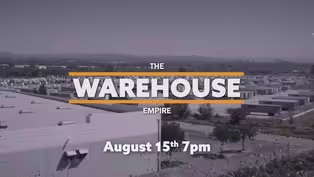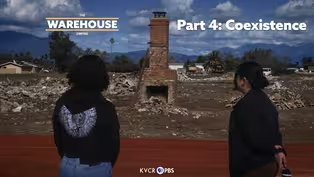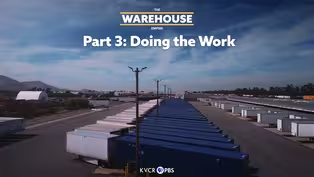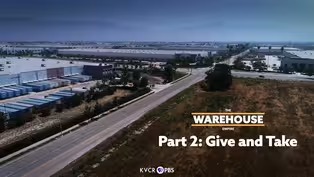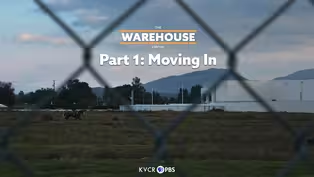The Warehouse Empire
Part 1: Moving In
Clip | 13m 24sVideo has Closed Captions
Discover why the Inland Empire is ideal for warehousing and how it impacts local residents.
Affordable land and geographical location are two major factors that make the Inland Empire region an ideal hub for distribution and warehousing development. Discover what this means for its residents on a social and environment level.
Problems playing video? | Closed Captioning Feedback
Problems playing video? | Closed Captioning Feedback
The Warehouse Empire is a local public television program presented by KVCR
Support of the Empire Warehouse series on KVCR-TV comes from the Creative Corps Inland SoCal, a collaboration between the California Arts Council, the Inland Empire Community Foundation, Arts Connection, Riverside...
The Warehouse Empire
Part 1: Moving In
Clip | 13m 24sVideo has Closed Captions
Affordable land and geographical location are two major factors that make the Inland Empire region an ideal hub for distribution and warehousing development. Discover what this means for its residents on a social and environment level.
Problems playing video? | Closed Captioning Feedback
How to Watch The Warehouse Empire
The Warehouse Empire is available to stream on pbs.org and the free PBS App, available on iPhone, Apple TV, Android TV, Android smartphones, Amazon Fire TV, Amazon Fire Tablet, Roku, Samsung Smart TV, and Vizio.
- [Announcer] Support of the Empire Warehouse series on KVCR-TV comes from the Creative Corps Inland SoCal, a collaboration between the California Arts Council, the Inland Empire Community Foundation, Arts Connection, Riverside Arts Council, and the California Desert Arts Council, putting visual and media artists to work in the region.
And, viewers like you.
Thank you.
[gentle music] ♪ (traffic sounds) ♪ (traffic sounds) ♪ - [Sofia] Looking at these photos from the Inland Empire, I always forget that it was known as the Orange Empire.
It just used to be a bunch of oranges, vineyards, and, of course, Route 66.
And, I think coming from a city like this, you can't help but be obsessed with the culture and history that exists here.
And, I know people can kind of be distraught about the state of the city, but when I look at photos like this, I'm reminded of how great it was, but also how great it can be.
And, that's kind of why I named my own company, Come & See Media because when you look deeper, you can really find the beauty and the resilience and the roses growing from the concrete.
[light hopeful music] ♪ Back then in the I.E., it used to be wake up and smell the oranges.
It used to be just rows and rows of-- Oh, wait.
I forgot we're in the Warehouse Empire.
[upbeat music] ♪ (door clicks) [gentle music] ♪ (metal clanks in box) ♪ (door clicks) - [Sofia] I think for a lot of us online shopping has become a normal part of our lives, some of us more than others.
But whether it's buying an outfit, ordering some vitamins you need, or getting some parts you needed for your car, we all online shop.
Well?
All this online shopping needs facilities, right?
And, I've been noticing a lot of stuff in the Inland Empire and one thing that's starting to concern a lot of people that live in our communities is the logistics and warehouse industry.
And, well?
The I.E.
has an interesting relationship with it.
(plastic crinkling) ♪ If you live in the Inland Empire you probably have been noticing it too, whether it's the trucks surrounding you when you're on the 10, or the Amazon warehouses being built around you, or the pollution getting worse.
I think it's something that we all notice.
And, I'm no expert on the topic, but as a concerned citizen who lives in this community, I am going to talk to experts and community members that can help me learn more about what is going on in the I.E.
[gentle music] - [Sofia, narrating] The first person that came to mind was an old friend that I met when we did a panel on media and community representation.
And, that is environmental and health journalist, Anthony Victoria.
I brought you to this place 'cause you could kind of see, like, the valley.
There was a fire.
But-?
- You see the layer of pollution.
- Yeah.
- Small layer.
Not as thick as some days, but-?
- Yeah.
Not the nice cloud.
What have you seen are some patterns of why warehouses specifically choose the Inland Empire for like, establishing their buildings?
- I think there's several reasons, but one of the main ones is cheap rent.
So, developers find that the land here is leased at very low rates compared to other regions.
The other reason is that it's a strategic point of goods movement, and it always has been, if you look at our history.
You have places like Colton, which were founded by railroad companies and other Fortune 500 companies for that same reason.
And so, over time, we've seen that this is a place of movement.
I personally think, and this is me speaking as a resident, I personally think you have to have the community at the negotiating table.
- [Sofia] Yeah.
- And, I think right now, it's sort of the other way around.
It's the developers sitting with the people in power.
If, for regular people who work in these warehouses, for people that maybe live next to these freight corridors are at the table with these developers, they're making clear demands about what they want to see and that those demands are actually met, and that there's some kind of middle ground.
And, I think for now, we haven't really seen that in this region, unfortunately.
- It's kind of hard to collab with someone when you're not on the same table that they are.
[gentle music] ♪ - Along with the economic disparities, along with the plight, there's people struggling to breathe.
There's people who are dying of cancer, people like my mom.
She died of cancer, unfortunately.
Right?
So, many other people that actually have organized in this movement who have come before people like you and I, have passed away as a result of the impacts, right?
It's like a slow violence.
That's what I always- - Yeah.
- like to tell people, right?
It might not be inherently violent in the sense that somebody is stabbing you or somebody is killing you directly.
But by them making these decisions, which are methodical, right, they create studies and stuff.
They approve these projects.
By the time 5, 10 years pass by, you notice your lungs feel heavier, right?
You begin to get sick.
You begin to develop cardiovascular diseases.
You begin to develop respiratory diseases.
All that stuff has an impact.
And, slowly, what that's doing, it's depleting not only our lungs and our health, but it's depleting the natural environment around us.
And so, in a lot of ways, people are fighting, fighting for their lives.
And, I think the urgency needs to be felt a little bit more I think when it comes to these government agencies, when it comes to these elected officials.
I think a lot of folks want to engage with these people.
They want these folks to listen to them.
They wanna look at them and say, "Hey, help me.
We're not here to antagonize you".
But, it has to be a two-way street.
And, I think in some cases, it's definitely not a two-way street.
[mellow music] - [Sofia] That conversation with Anthony really helped me understand how big the warehousing industry is and how it's slowly been changing the landscape of many cities here in the I.E.
Not only that, but how it affects the people who live near them.
One of the cities being hit the most by warehouse development is Bloomington.
This city, a once rural town, is now slowly being surrounded by warehouses in cities next to them and also within them.
(birds singing) (dogs barking) - [Sofia] So, we are totally not surrounded by warehouses!
(birds singing) On a more serious note, we are at the Rocha's old house, who we are gonna be speaking to next.
And, I've seen photos of their house, but I had to check it out in person.
And in person, it's kind of dystopian.
Even from this view, it's...um?
Reminds me of the house from "Up".
It's kind of sad, honestly.
Like, you buy a house with your significant other, and has a nice view of the mountains and the landscape.
And then, when you're about to retire, you have a neighbor called Amazon and they build huge slabs of concrete that just, like, completely blocks that view.
So, yeah.
It's kind of unreal.
[gentle music] ♪ - In 2014, we received a letter about the property behind us.
'Cause we were wondering, how come it's not being built?
And, the economy was rough.
So, people weren't building.
And, there was a-?
From the county, talking about a developer was interested in purchasing that property.
- [Kim] Or, first turning the land to commercial instead of residential.
- [Sofia] Oh, so it was zoned residential?
- Yes!
Yes, yes!
27 homes were supposed to go there, or 29.
- That's what the letter stated.
That developer was-- wanted to change this from residential, commercial and double shot, and build a-?
Like, a 340,000 square foot warehouse.
- We saw the developers canvass in the area.
Right?
Yeah.
They were walkin' around our neighborhood and my husband noticed them.
And goes, "who are those guys?"
Huh?
And then, we decided to have a little meeting at our house.
- [Sofia] Oh, yeah.
- [Kim] And-?
Well, the developers came there and met.
But they thought they were gonna do it individual, like that?
But, we had a group come to my house because we figured, you know, seven, eight heads are better than two!
(laughs) - [Sofia] Yeah!
- Yeah!
So, we had-?
So, we-?
They met with us, and we told them we didn't want their project.
There was nothin' they could say!
(chuckles) We didn't want their project.
- [Thomas] They found out, basically, that I was the-- Called me the ringleader; that I was the one that developed the letter and passed it out.
And then, he proposed a $55,000 offer if my wife and I would get on board, and (coughs) tell the community, "Be an advocate for the warehouse", and tell the community how great it would be for our community.
- [Sofia] Trying to buy you guys out.
- Exactly, exactly.
[gentle music] ♪ - [Sofia] So, as we know, the warehouse ended up being developed.
How did you guys first get that news?
And, how was life after that?
- [Thomas] That morning, I think it was September the 25th.
(shaky) My father was in the hospital.
- [Kim] Yeah.
So, he-?
So, it was a vote and his father passed that morning.
So, it was really devastating.
So, my husband thought it was so important and his dad would want him to go.
He just put his feelings aside and we went to the-- Because they were voting on the warehouse that day, and we had put, like he said, five years into our life into that.
And, they voted and they passed it.
They passed it four to one.
But, we had standing room only; people couldn't even get in there.
I mean, people had took off work.
And, we had-- They said, like, 300 people on the outside.
They couldn't even get in.
So, that's how many people were-- yeah!
And then, the whole room was packed.
- You talk about brokenhearted people, and- - Oh gosh, devastation.
- Devastation.
It was-- We were so-?
It was quiet.
Like, we're like stunned that it passed and all the hard work that we did.
- We kind of let it absorb.
You know?
And, we're prayers.
You know?
So, we prayed a lot.
We cried a lot.
And, we said like, what are we gonna do?
Our quality of life is now gonna be-?
It's just so different from what we thought our retirement years would be.
So, we said, "what are we gonna do, Tom?"
So, actually Tommy and I, we decided to move.
You know?
- I'll tell you this.
(coughs) The main thing I have to say, tell people, you need to speak up.
You need to speak up.
Like, I used a quote from Dr. Martin Luther King, Jr.: "Our lives begin to end the day we become silent on things that matter."
♪ - [Sofia] After speaking to Anthony, and the Rochas, it really helped me understand how warehousing is affecting communities.
But now, I'm wondering why are they coming to our communities?
And, how does that process look like when a warehouse wants to come to the Inland Empire?
[bold string music] ♪ ♪ [upbeat music] ♪ [music fades] - [Announcer] Support of the Empire Warehouse series on KVCR-TV comes from the Creative Corps Inland SoCal, a collaboration between the California Arts Council, the Inland Empire Community Foundation, Arts Connection, Riverside Arts Council, and the California Desert Arts Council, putting visual and media artists to work in the region.
And, viewers like you.
Thank you.
Preview | 30s | Sofia Figueroa investigates the growth of the warehouse and logistics sector in the Inland Empire. (30s)
Video has Closed Captions
Clip | 18m 10s | The warehouse and logistics industry will continue to shape the Inland Empire. (18m 10s)
Video has Closed Captions
Clip | 11m 30s | Warehouse workers are vital but face job quality challenges. (11m 30s)
Video has Closed Captions
Clip | 13m 18s | The warehouse and logistics sector offers jobs but also comes at a cost. (13m 18s)
Video has Closed Captions
Clip | 13m 24s | Discover why the Inland Empire is ideal for warehousing and how it impacts local residents. (13m 24s)
Providing Support for PBS.org
Learn Moreabout PBS online sponsorship
- News and Public Affairs

Top journalists deliver compelling original analysis of the hour's headlines.

- News and Public Affairs

FRONTLINE is investigative journalism that questions, explains and changes our world.












Support for PBS provided by:
The Warehouse Empire is a local public television program presented by KVCR
Support of the Empire Warehouse series on KVCR-TV comes from the Creative Corps Inland SoCal, a collaboration between the California Arts Council, the Inland Empire Community Foundation, Arts Connection, Riverside...
